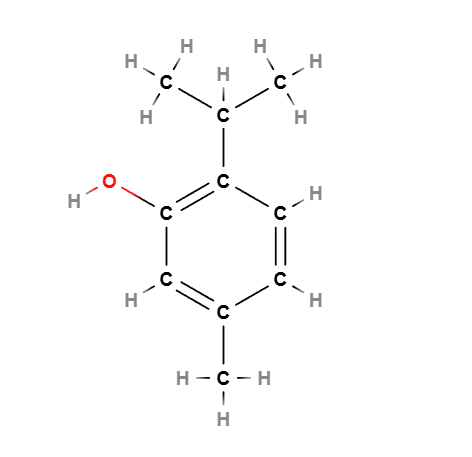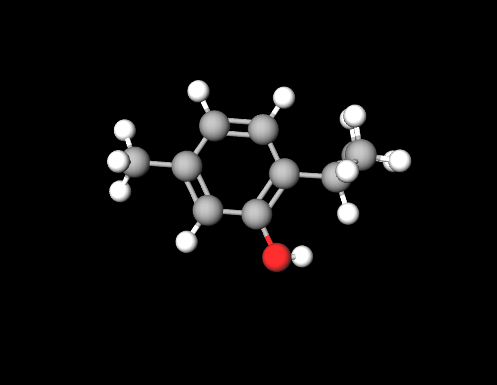| "Descrizione" by admin (19549 pt) | 2024-Sep-18 16:08 |
Thymol is a natural monoterpenoid phenol derived from the oil of thyme and other aromatic plants. It is well-known for its potent antimicrobial, antifungal, and antioxidant properties, making it valuable in cosmetic, pharmaceutical, and food applications.
Chemical Composition and Structure
The chemical composition of Thymol includes:
- Chemical Formula: C₁₀H₁₄O.
- Functional Groups: It contains a hydroxyl group (–OH) attached to a phenolic ring, contributing to its bioactive properties.
Structurally, Thymol is characterized by its aromatic ring and isomeric structure, which enhance its stability and reactivity in various formulations.
Physical Properties
- Appearance: A colorless to pale yellow liquid.
- Solubility: Soluble in alcohol and oils; limited solubility in water.
- pH: Generally neutral, but can vary based on formulation.
- Odor: Strong, aromatic, and herbal scent characteristic of thyme.
- Stability: Sensitive to light and air; should be stored in a cool, dark place to maintain potency.
Production Process
- Extraction: Thymol is typically extracted from thyme oil (Thymus vulgaris) through steam distillation.
- Purification: The crude oil may undergo purification to isolate Thymol from other components.
- Formulation: The purified compound can be incorporated into various products, including cosmetics, dietary supplements, and food formulations.
Applications
- Medical: Used in herbal medicine for its antimicrobial and antifungal properties.
- Cosmetics: Commonly included in skincare products for its antioxidant effects and ability to promote skin health.
INCI Functions:
Oral care agent. This ingredient can be placed in the oral cavity to improve and/or maintain oral hygiene and health, to prevent or improve a disorder of the teeth, gums, mucous membrane. It provides cosmetic effects to the oral cavity as a protector, cleanser, deodorant.
Fragrance. It plays a very important role in the formulation of cosmetic products as it provides the possibility of enhancing, masking or adding fragrance to the final product, increasing its marketability. It is able to create a perceptible pleasant odour, masking a bad smell. The consumer always expects to find a pleasant or distinctive scent in a cosmetic product.
Skin conditioning agent - Miscellaneous. This ingredient has the task of modifying and improving the condition of the skin when it is damaged or dry, reducing flaking and restoring its elasticity.
Denaturant. It makes cosmetics unpalatable. It is sometimes added to cosmetics containing ethyl alcohol to make it unsuitable for ingestion. The ionic or polar molecules of this ingredient included in formulations that interact with protein groups, modulate the properties of the solution to suit specific needs.
- Food: Utilized as a natural preservative and flavoring agent due to its potent antimicrobial activity.
- Industrial Uses: Limited applications, primarily in formulations for natural products.
Environmental and Safety Considerations
Thymol is generally regarded as safe for use in cosmetics and food products when applied according to recommended guidelines. However, individuals with specific sensitivities should exercise caution. Responsible sourcing and production practices are essential to ensure that Thymol is free from harmful contaminants and produced sustainably.
 |  |
Molecular Formula C10H14O
Molecular Weight 150.22 g/mol
CAS 89-83-8
UNII 3J50XA376E
EC Number 201-944-8
Synonyms:
5-Methyl-2-isopropylphenol
2-Isopropyl-5-methylphenol
References__________________________________________________________________________
Peter S, Sotondoshe N, Aderibigbe BA. Carvacrol and Thymol Hybrids: Potential Anticancer and Antibacterial Therapeutics. Molecules. 2024 May 12;29(10):2277. doi: 10.3390/molecules29102277.
Abstract. Cancer is ranked among lethal diseases globally, and the increasing number of cancer cases and deaths results from limited access to effective therapeutics. The use of plant-based medicine has been gaining interest from several researchers. Carvacrol and its isomeric compound, thymol, are plant-based extracts that possess several biological activities, such as antimalarial, anticancer, antifungal, and antibacterial. However, their efficacy is compromised by their poor bioavailability. Thus, medicinal scientists have explored the synthesis of hybrid compounds containing their pharmacophores to enhance their therapeutic efficacy and improve their bioavailability. Hence, this review is a comprehensive report on hybrid compounds containing carvacrol and its isomer, thymol, with potent anticancer and antibacterial agents reported between 2020 and 2024. Furthermore, their structural activity relationship (SAR) and recommended future strategies to further enhance their therapeutic effects will be discussed.
Wang Q, Qi G, Zhou H, Cheng F, Yang X, Liu X, Wang R. Protective effect of thymol on glycerol-induced acute kidney injury. Ren Fail. 2023 Dec;45(1):2227728. doi: 10.1080/0886022X.2023.2227728.
Abstract. Acute kidney injury (AKI) is a syndrome characterized by an accelerating decrease in renal function in a short time. Thymol is one of the main components of thyme species and has a variety of pharmacological effects. Here, we investigated whether thymol could ameliorate rhabdomyolysis (RM)-induced AKI and its related mechanism. Glycerol was used to induce RM-associated AKI in rats. Rats received thymol (20 mg/kg/day or 40 mg/kg/day) gavage 24 h before glycerol injection until 72 h after injection daily. Kidney injury was identified by measuring serum creatinine (Scr) and urea levels and by H&E and PAS staining and immunohistochemistry (the expression of proliferating cell nuclear antigen (PCNA)). Renal superoxide dismutase (SOD), malondialdehyde (MDA), and oxidative stress-related Nrf2/HO-1 signaling pathways were measured. The expression of the inflammatory markers TNF-α, IL-6, MCP-1, and NF-κB was assessed by ELISA and western blotting. Finally, the expression of the PI3K/Akt signaling pathway was detected by western blotting. Glycerol administration induced obvious renal histologic damage and increased Scr, urea, and PCNA expression. Notably, thymol treatment attenuated these structural and functional changes and prevented renal oxidative stress, inflammatory damage and PI3K/Akt pathway downregulation associated with glycerol-induced AKI. In conclusion, thymol might have potential applications in the amelioration of AKI via its antioxidant and anti-inflammatory effects and upregulation of the PI3K/Akt signaling pathway.
Subramaniyam S, Yang S, Diallo BN, Fanshu X, Lei L, Li C, Tastan Bishop Ö, Bhattacharyya S. Oral Phyto-thymol ameliorates the stress induced IBS symptoms. Sci Rep. 2020 Aug 17;10(1):13900. doi: 10.1038/s41598-020-70420-4.
Abstract. Physical stressors play a crucial role in the progression of irritable bowel syndrome (IBS). Here we report a heterogeneous physical stress induced IBS rat model which shows depression and subsequent modulation of IBS by oral treatment of thymol. Oral administration of Thymol reduces the stress induced IBS significantly altering the stress induced gastrointestinal hypermotility, prolonged the whole gut transit time, and increased abdominal withdrawal reflex suggesting gastrointestinal hypermotility and visceral discomfort caused the onset of depression. Immunohistochemical analysis in small intestine and colon of rats shows the decreased 5-HT3AR expression level while thymol treatment normalized the 5-HT3AR expression in the stressed rats. Molecular docking studies showed that thymol competes with endogenous serotonin and an antagonist, Tropisetron and all have similar binding energies to 5-HT3AR. Molecular dynamics simulations revealed that thymol and tropisetron might have similar effects on 5-HT3AR. Our study suggest that thymol improves IBS symptoms through 5-HT3AR, could be useful for the treatment of IBS.
| Evaluate |

